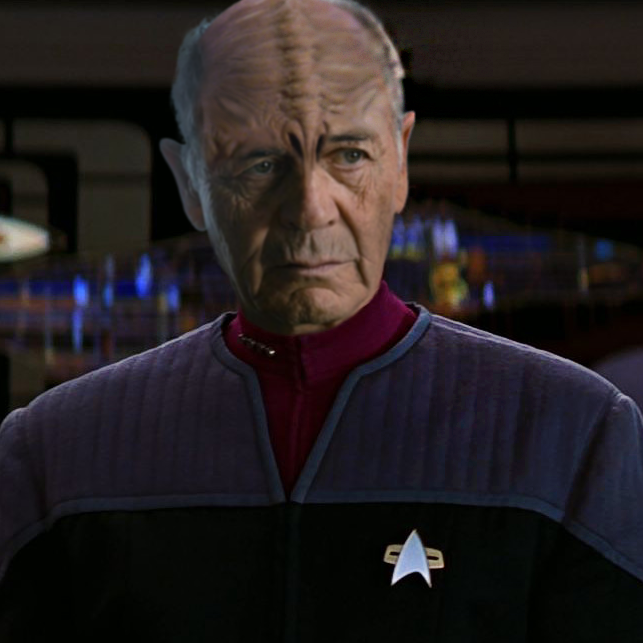“–reviewed the internal sensor logs from Refinery 04H. Personally,” said Kecene, the Reman Consul of Vitality. She spoke slowly, luxuriating in every word. The elder Reman presented herself as an austere figure, clad in traditional Reman body armour. Captain Taes noticed the dichotomy inherent in the provisional government’s representative for health deciding to wear a battlesuit for their negotiations. Taes suspected there was an intentional message in that dichotomy. The clean lines of Kecene’s iridescent body armour shone in stark contrast to the industrial kitchen where Kecene had chosen to meet with Taes, in private. The cookery equipment was covered in enough rust to suggest a century of disuse, by Taes’ assessment, and all of it was old-fashioned enough to suggest it had been built a century before that.
Towering over Taes, Kecene held her body very still, as always. As was her wont, Kecene’s gravel pit of a voice paused at irregular intervals while she spoke. Taes couldn’t be sure if Kecene was choosing her words carefully or if she had a breathing ailment from her decades of work in the underground refineries. Kecene said, “Only your Starfleet officers had… access to the hydroponic garden supplies and plants you provided. There was no evidence of outside tampering on… our sensor logs.”
“I don’t have to tell you, consul, how easily sensor logs can be edited,” Captain Taes said, in a somewhat clunky use of double-speak. It concerned Taes how early in the discussion she was losing control of her heart-rate and her breathing. When Taes had beamed down to the refinery’s kitchen at the appointed time, Kecene had left Taes alone to wait for an hour. In that time, Taes had prepared three different conversational gambits for this discussion, but her mind kept wandering to worry about Kellin’s whereabouts and well-being. No amount of micro-meditation or grounding in her physicality was entirely successful in keeping Taes’ thoughts progressing in a linear fashion. After perfunctory re-introductions, the discussion had quickly pivoted to the deaths of Lieutenant Susarla and the four Reman youths, along with Taes’ offer of condolences. Taes affirmed, “Starfleet has no reason to harm your people and I would never sacrifice one of my own officers. My doctor has identified a poison of Romulan origin in her system when she died.”
Kecene’s head tilted a single millimetre. “I know the Romulans capable of what you suggest, captain. I have no way to… know what Starfleet would… or would not do,” Kecene said. Her flinty voice betrayed little of her thoughts or emotions on the manner. Taes supposed Kecene’s choice of words would have to tell her everything. Kecene’s eyes narrowed on Taes when she asked, “Did your USS Temeraire not… celebrate the activation of Kunhri’s own tachyon detection grid? How… might any Romulans come close enough…. to Kunhri Three to tamper with your garden, captain?”
“In confidence, consul,” Taes hesitantly said, “the other Starfleet captains in my task group have held suspicions of a cloaked warbird in the system, even before the detection grid was completed. It could only take one cloaked shuttle, or a base camp in an abounded factory, to beam a chemical compound into a few vegetables.”
“Hmm,” Kecene vocalized, her otherwise expressionless eyes appraising Taes while she spoke. “A few or perhaps… all of the gardens are now tainted. Our autopsies of our four citizens have also discovered the evidence of felodesine poisoning.” Kecene folded her hands behind her back, pausing again, before she said, “I can detect no… motive for Starfleet to cause these deaths. First Consul J’mek is in agreement… but my people are less credulous. We hold no secrets from each other. In retaliation, workers in three of the refineries have burned the hydroponic gardens to ash.”
Taes breathed in through her nose. It was a deep breath, taking much longer than she expected to fill her lungs. “We can rebuild,” Taes said.
At Taes’ words, Kecene shook her head slowly. “Rebuild? I don’t think. Gardening was a folly. Our priority must remain on the refineries,” Kecene said in utter certainty. “Refineries 13J and 06V have… barely resumed thirty percent functionality after the repairs completed by your other Starfleet crews. If the refineries do not run, we have noting to… trade with the rest of the Velorum sector. Our latest supplies from Psi Velorum are… worryingly delayed. Kunhri is not Agarath or Foshir or Rhijun. We do not produce products of unique value. Our reputation for reliability is what we offer. We must have export if we are to compensate our people fairly and improve the quality of life for all.”
Taking a step closer to Taes, Kecene informed the starfleet captain, “We will accept more replicators from Dvorak.”
Her emotional guards slipping further, Taes cringed at that request. USS Dvorak was no cargo hauler at Kecene’s command. Taes’ heart was overflowing with pride for the research being performed by her ecology, biology and anthropology teams. “Consul Kecene, there is no future in replicators. Not for many years to come,” Taes said, expressing her guileless concern and fear for the solution Kecene was proposing. “Replicators are only efficient when they’re fuelled with organic particulate suspension. Without that raw food stock, the energy cost is exponentially higher. If you start dematerializing rocks or waste to replicate food, you’ll burn through the power cells in no time. I’ve seen the reports from Daradax and Neptune. Your electro-plasma distribution grid can barely provide the energy you need to power the refineries. Kunhri Three will need a new energy infrastructure, and raw food stock factories, before replicators can feed your world indefinitely.”
Despite everything Taes said, Kecene’s blank expression remained unchanged. “No Remans will be gardeners,” Kecene said.
“I’m not,” Taes said emphatically, “reciting from a textbook. My colony succumbed to ecological disaster when I was young. The power plant failed and we lost all replicators and refrigeration units. The batteries only lasted so long. Help couldn’t reach us because of the Dominion War.” Pleading with Kecene, Taes said, “Consul, I would never wish hunger delirium on your population. Even in Remans, it can cause memory loss, combative behaviour, disorientation, hallucination…”
Through gritted teeth, Kecene said, “We have medications for those symptoms if it comes to that.”
“Who will work the refineries?” Taes asked, “when your populations is drugged?”
“I have conferred with First Consul J’mek,” Kecene interjected, raising her voice in a formal timbre. “We are prepared to release your officers in exchange for more replicators. Given your… suggestions, we will also accept sarium krellide power cells and a further stockpile of organic particulate suspension.”
Now it was Taes who shook her head at Kecene. “The Romulan way of living, your enforced labour, these things don’t have to define you,” Taes insisted in optimism. Her eyes lit up with the excitement of possibility; her hands emphasize each of her points as she went on. “We’ve studied your planet and your civilization. We understand your nutritional needs. Your path to food security can’t be paved by honouring the interests of industry. Food security will only come when you change the systems that are failing you. Centre your own dietary needs through farming. Growing your own food is the only path forward.”
“You’re a leader now,” Taes continued, her voice barely above a whisper. “You have to make the hard decisions to do what’s right for your people. On my colony, we ran out of food. I had to forage for scraps, but our planet was not half as fertile as Kunhri Three. My parents, they didn’t want to take food out of my mouth. One night, they… they walked into the woods and I never heard from them ag–“
Physically recoiling from Taes, Kecene blurted out, “What horror is this?! You wish me dead? You know nothing of my life or my duty!”
“No, consul,” Taes stammered, “That’s not–“
Talking over Taes, Kecene snarled, “Because I don’t reach the same conclusions as Starfleet, you think my mind is still caged by the Romulans? My entire generation should die to make way for our young?”
“Consul, I promise, I didn’t–” Taes tried to cut in.
“Get off my planet, you beast!” Kecene declared. “Your mission has failed. Your Dvorak is no longer welcome in the Kunhri system!”
Taes’ mind spun in two direction: split between a desire to shore up these crumbling negotiations and her need to protect her crew. As much as her conscious mind was locked up in indecisive abulia, there was a visceral, desperate corner of her mind that forced her to speak up. “I will have more replicators manufactured and delivered to you, consul,” Taes said diffidently.
Kecene left her alone in the abandoned kitchen once again.
The passage of time became nonlinear for Taes. Indistinct. The sense of loss radiating from the core of her proved too much for her ego and she experienced an out-of-body sensation in self-protection. Taes recognized how risky a gambit it had been, experimenting with Kecene’s responses to vulnerability, trying to reach out for empathy at this transitional time. Without greater preparation, it was this negotiation tactic that had been Taes’ greatest folly. Taes still didn’t know enough about Reman psychology, nor had she constructed an airtight metaphor to compare her lived experiences to that of the Remans. In no way had Taes intended to speak on her own experiences, not in any of her conversational preparations. But she had lost her temper. Her need for achievement had carried her aloft to undiscovered places, when reason was having less and less impact on Kecene’s intentions.
During her self-reflection spiral, further banks of Starfleet replicators and storage crates were beamed into the kitchen around Captain Taes. Soon after, Kellin Rayco and his away team were escorted into the kitchen by a Reman guards. With any sense of propriety gone, Taes snatched up Kellin in an urgent hug and buried her face in his chest. “Let’s get the hell out of here,” Taes said, and the Dvorak‘s transporter whisked them all away.

 Bravo Fleet
Bravo Fleet









